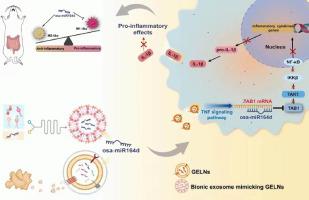Ginger exosome-like nanoparticle-derived miRNA therapeutics: A strategic inhibitor of intestinal inflammation
IF 11.4
1区 综合性期刊
Q1 MULTIDISCIPLINARY SCIENCES
引用次数: 0
Abstract
Introduction
MicroRNAs (miRNAs) involve in destabilising messenger RNA or repressing translation of target molecules. Ginger-derived exosome-like nanoparticles (GELNs) play a crucial role in modulating intestinal inflammation. Moreover, GELNs contain highly heterogeneous miRNA. However, the role of miRNAs derived from GELNs in immunomodulation remains unclear.
Objectives
This study aimed to elucidate the molecular basis of the unique biological effects mediated by miRNA derived from GELNs on macrophages.
Methods
GELNs were isolated using a combination of commercial exosome isolation kits and the differential centrifugation method, and the lipid composition of GELNs was determined using liquid chromatography-mass spectrometry. Subsequently, PKH26 labelled GELNs were taken up by macrophages. Furthermore, the modulation of inflammatory and immune responses by GELNs or osa-miR164d was assessed through the RNA-seq, RT-qPCR, online databases, and dual luciferase reporter assays to explore the underlying mechanisms of osa-miR164d. Biomimetic exosomes loaded with osa-miR164d were prepared using a microfluidic mixing device and systematically characterized. The therapeutic effects of osa-miR164d on relieving colitis were evaluated.
Results
We report for the first time that GELNs-derived osa-miR164d is a regulatory factor of reprogramming macrophage polarization, thereby inhibiting the intestinal inflammatory response. Mechanistically, osa-miR164d directly targets the 3′-UTRs of TAB1, which regulates macrophage polarization through the downregulation of NF-κB expression. In addition, We have designed a biomimetic exosome mimicking GELNs to deliver osa-miR164d (osa-miR164d-MGELNs). Notably, the osa-miR164d-MGELNs can efficiently reprogram macrophages to alleviate colitis-related symptoms.
Conclusion
Our findings enhance the systematic understanding of how GELNs-derived osa-miR164d mediates cross-kingdom communication and provide an original engineering paradigm for mimicking GELNs to transfer miRNA.


生姜外泌体纳米颗粒衍生的 miRNA 疗法:肠道炎症的战略抑制剂
微小核糖核酸(miRNA)参与破坏信使核糖核酸的稳定性或抑制目标分子的翻译。姜源性外泌体纳米颗粒(GELNs)在调节肠道炎症方面发挥着至关重要的作用。此外,GELNs 还含有高度异质性的 miRNA。然而,来自 GELNs 的 miRNA 在免疫调节中的作用仍不清楚。本研究旨在阐明源自 GELNs 的 miRNA 对巨噬细胞产生独特生物效应的分子基础。研究人员使用商业外泌体分离试剂盒和差速离心法分离了GELNs,并使用液相色谱-质谱法测定了GELNs的脂质成分。随后,PKH26 标记的 GELNs 被巨噬细胞吸收。此外,还通过RNA-seq、RT-qPCR、在线数据库和双荧光素酶报告实验评估了GELNs或osa-miR164d对炎症和免疫反应的调节作用,以探索osa-miR164d的潜在机制。利用微流体混合装置制备了负载有osa-miR164d的仿生外泌体,并对其进行了系统表征。评估了osa-miR164d对缓解结肠炎的治疗效果。我们首次报道了 GELNs 衍生的 osa-miR164d 是一种重编程巨噬细胞极化的调节因子,从而抑制了肠道炎症反应。从机理上讲,osa-miR164d直接靶向TAB1的3′-UTRs,通过下调NF-κB的表达来调控巨噬细胞的极化。此外,我们还设计了一种模拟GELNs的生物外泌体,用于递送osa-miR164d(osa-miR164d-MGELNs)。值得注意的是,osa-miR164d-MGELNs能有效重编程巨噬细胞,从而缓解结肠炎相关症状。我们的研究结果加深了人们对GELNs衍生的osa-miR164d如何介导跨领域交流的系统性理解,并为模仿GELNs转移miRNA提供了一种独创的工程范式。
本文章由计算机程序翻译,如有差异,请以英文原文为准。
求助全文
约1分钟内获得全文
求助全文
来源期刊

Journal of Advanced Research
Multidisciplinary-Multidisciplinary
CiteScore
21.60
自引率
0.90%
发文量
280
审稿时长
12 weeks
期刊介绍:
Journal of Advanced Research (J. Adv. Res.) is an applied/natural sciences, peer-reviewed journal that focuses on interdisciplinary research. The journal aims to contribute to applied research and knowledge worldwide through the publication of original and high-quality research articles in the fields of Medicine, Pharmaceutical Sciences, Dentistry, Physical Therapy, Veterinary Medicine, and Basic and Biological Sciences.
The following abstracting and indexing services cover the Journal of Advanced Research: PubMed/Medline, Essential Science Indicators, Web of Science, Scopus, PubMed Central, PubMed, Science Citation Index Expanded, Directory of Open Access Journals (DOAJ), and INSPEC.
 求助内容:
求助内容: 应助结果提醒方式:
应助结果提醒方式:


